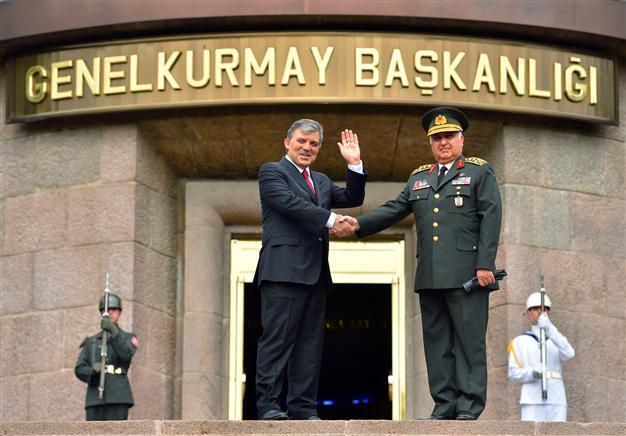Outgoing President Gül urges gov’t to allow Parliament scrutiny over defense expenditure
ANKARA

President Abdullah Gül shakes the hands of Turkish army chief Necdet Özel during a farewell visit to the General Staff in Ankara, Aug. 7. AA Photo
A comprehensive report prepared by the Presidency has urged the government to permit the Parliament to exert scrutiny over defense expenditures and exercise adequate democratic control over defense policies.
Written by a team of civilian and military experts upon the instructions of President Abdullah Gül, the “Defense Report” is regarded as a first of its kind and contains not only the shortcomings of the current state of the army and defense management but also suggestions for correcting them.
“While Turkey has been undertaking deep reforms in all fields, I regard the ignoring of the field of defense as a deficiency. It’s obvious that we can no longer delay comprehensive defense reform in light of regional developments and of an increasingly complicated and uncertain international security environment,” Gül said in the preface to the report. Gül will hand over the presidency on Aug. 28 to President-elect Recep Tayyip Erdoğan.
One of the most important points underlined in the report is the public impression about the lack of control of defense expenditures although Turkey’s Court of Accounts is legally tasked with scrutinizing public expenditures. “In order to break this impression, the Court of Accounts should inform the public about its control of defense expenditures and should report them without any exception,” said the report.
The report also underlined that the reports prepared by the Court of Accounts were not being investigated by an expert commission at Parliament and called on the government to remove obstacles before establishing an expert commission under Parliament’s roof.
“In order to allow the Parliament to fulfill this task, obstacles should be removed; necessary transparency should be brought about and the level of knowledge and expertise should be increased,” it read.
Readiness for electronic warfare The report determined that the size of the combat troops of the Turkish Armed Forces (TSK) was less compared to the armies of developed countries and listed suggestions to increase its efficiency.
“The TSK should adopt cross-border capabilities for establishing base areas and strategic deployment in a bid to be able to deploy military presence beyond its borders,” it said.
Here are some points underlined by the report:
- Given the current regional security environment, Turkey should complete its projects of acquiring “aerial and missile defense” and “electronic warfare” as soon as possible.
- Given the current threats and risk environment around Turkey and in light of Turkey’s responsibilities deriving from its alliance requirements, the TSK should have a NATO-like “rapid reaction force” composed of a combined structure with land, air and naval forces.
- A combination of compulsory and professional military service is falling short in meeting contemporary needs and should thus be changed. In light of the country’s human resources and economic capabilities, the transition to a professional army at the maximum level should be targeted. Paid military service should only be implemented for Turkish citizens residing abroad.
New defense management- There are two main different views on how to formulate the relationship between the Chief of General Staff and the Defense Ministry. Given the sensitivity of the issue which requires a constitutional amendment, it is necessary to deal with this formulation with utmost attention.
- The first view believes the TSK should only be focused on combat missions and should only be part of the decision-making processes of operative and tactical levels. All other missions should be left to the Defense Ministry whose structure will be renewed under a new organization. In the frame of the integrity of defense management, the Defense Ministry, the Chief of General Staff and all other force commands should be located in the same compound, just like in the United States or France.
- The second approach believes that the current structure of the TSK and the Defense Ministry should be preserved without taking into consideration the European Union’s norms on the issue.
